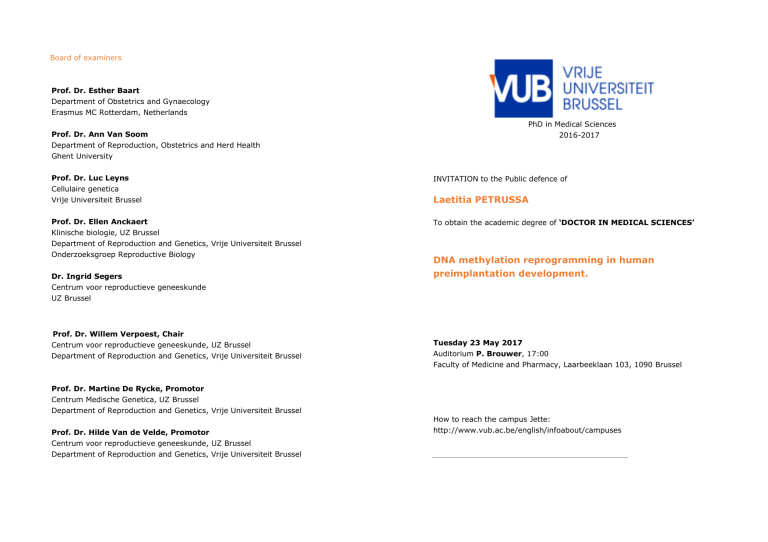
Board of examiners
Prof. Dr. Esther Baart
Department of Obstetrics and Gynaecology
Erasmus MC Rotterdam, Netherlands
Prof. Dr. Ann Van Soom
Department of Reproduction, Obstetrics and Herd Health
Ghent University
PhD in Medical Sciences
2016-2017
Prof. Dr. Luc Leyns
Cellulaire genetica
Vrije Universiteit Brussel
INVITATION to the Public defence of
Prof. Dr. Ellen Anckaert
Klinische biologie, UZ Brussel
Department of Reproduction and Genetics, Vrije Universiteit Brussel
Onderzoeksgroep Reproductive Biology
To obtain the academic degree of ‘DOCTOR IN MEDICAL SCIENCES’
Dr. Ingrid Segers
Centrum voor reproductieve geneeskunde
UZ Brussel
Prof. Dr. Willem Verpoest, Chair
Centrum voor reproductieve geneeskunde, UZ Brussel
Department of Reproduction and Genetics, Vrije Universiteit Brussel
Laetitia PETRUSSA
DNA methylation reprogramming in human
preimplantation development.
Tuesday 23 May 2017
Auditorium P. Brouwer, 17:00
Faculty of Medicine and Pharmacy, Laarbeeklaan 103, 1090 Brussel
Prof. Dr. Martine De Rycke, Promotor
Centrum Medische Genetica, UZ Brussel
Department of Reproduction and Genetics, Vrije Universiteit Brussel
Prof. Dr. Hilde Van de Velde, Promotor
Centrum voor reproductieve geneeskunde, UZ Brussel
Department of Reproduction and Genetics, Vrije Universiteit Brussel
How to reach the campus Jette:
http://www.vub.ac.be/english/infoabout/campuses
Summary of the dissertation
Curriculum Vitae
Epigenetic marks such as DNA methylation allow for gene expression
regulation independent of the underlying DNA sequence. During the first
days of embryonic development, there is genome-wide epigenetic
reprogramming that is essential for further development. Studies on human
and various animal models indicate that this epigenetic reprogramming
might be hampered by external and environmental factors such as those
present during assisted reproductive technologies (ART).
Since most of our knowledge on reprogramming in embryos came from
animal studies and species-specific differences in DNA (de)methylation
kinetics had been suggested in literature, there was a need to investigate
DNA
methylation
reprogramming
during
human
preimplantation
development. We therefore studied global DNA (de)methylation patterns
together with their regulators, the DNA methyltransferases (DNMTs), in
human oocytes, zygotes and embryos up to day 7 of in vitro preimplantation
development.
The data obtained from human good quality fresh embryos served as
reference data in studies of poor quality embryos and in safety studies
investigating the impact of oocyte or embryo cryopreservation on DNA
methylation reprogramming.
Appropriate DNA (hydroxy)methylation reprogramming was linked with good
embryo quality up to the blastocyst stage. Global methylation patterns as
well as DNMT expression patterns were disturbed in thawed embryos. The
data that emerged from our experiments differed compared to the current
model for DNA methylation reprogramming, largely based on mouse data,
calling for an amendment of the model.
Laetitia Petrussa was born in Anderlecht on June 4, 1986. She obtained
the degree of Master of Biomedical Sciences in 2009 at the Vrije
Universiteit Brussel (VUB) with a thesis titled ‘Analyse van DNA
methyltransferases in menselijke eicellen en preïmplantatie-embryos’’
promoted by Prof. Dr. Martine De Rycke of the Centre for Medical
Genetics and Prof. Dr. Hilde Van de Velde of the Centre for Reproductive
Medicine. She continued to work on this project and started her PhD
research in October 2009. Her research focussed on the assessment of
the epigenetic stability and safety of assisted reproductive technologies.
The project included research on human oocytes and embryos included in
this thesis, and research on epigenetic changes in placenta and cord
blood of children born after assisted reproduction. Since the start of this
PhD, Laetitia Petrussa has presented her work at various national and
international conferences and has published the articles of her PhD
dissertation in international peer-reviewed scientific journals.












